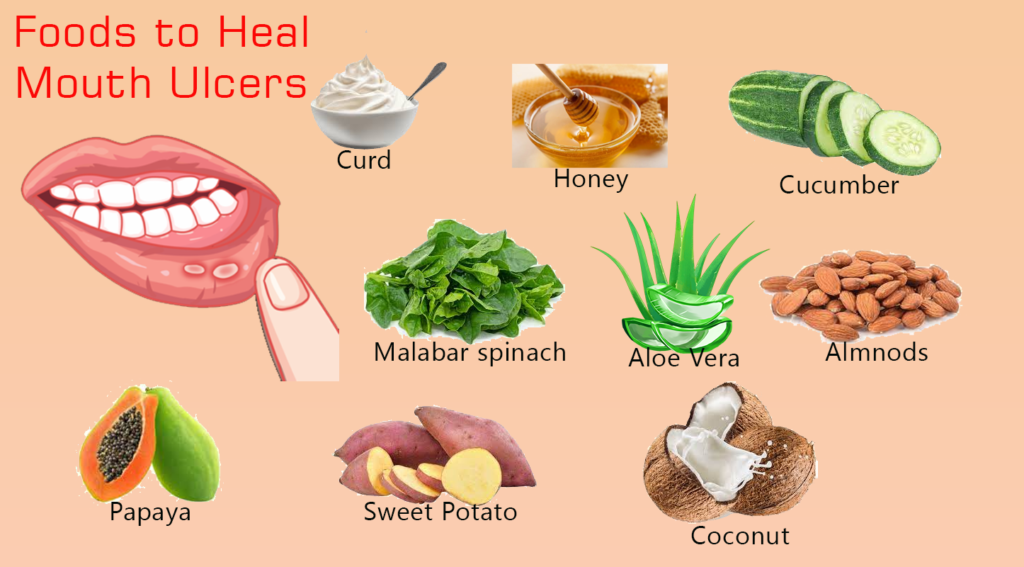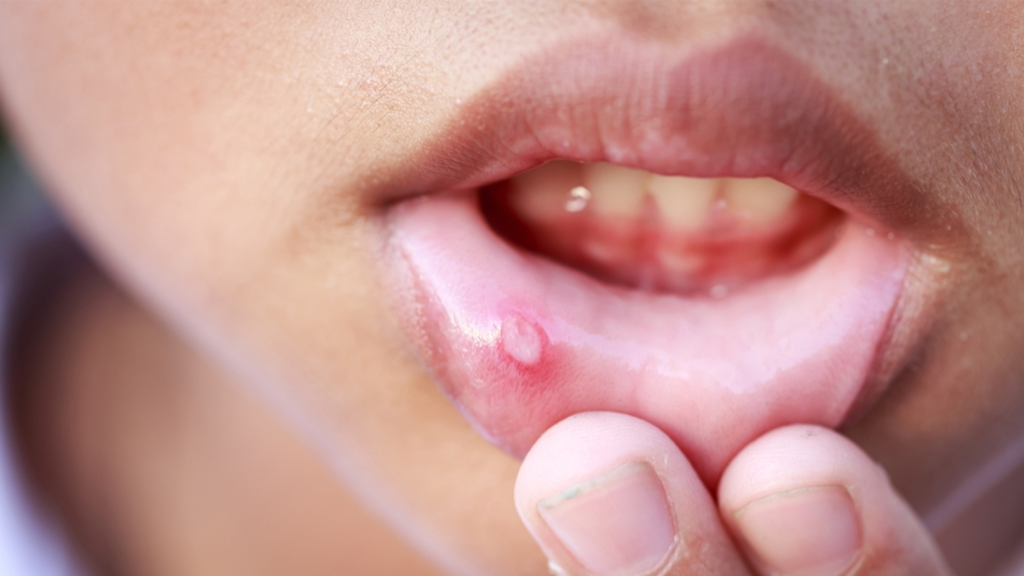Mouth ulcers aren’t very big, but they can be very painful and uncomfortable, making it hard to do things like talk, eat, and drink. Even though they are usually safe and go away on their own in a week or two, knowing what causes them, what signs they have, and what treatments might help can ease your pain and speed up the healing process. This segment will talk about mouth ulcers, including what causes them, how they show up, and which foods can help soothe them and help them heal faster.
Understanding Mouth Ulcers:
Mouth ulcers, also referred to as canker sores or aphthous ulcers, are tiny, painful sores that form on the mucous membranes of the mouth, such as the inner , gums, tongue, and lips. They usually manifest as circular or oval-shaped sores that are white or yellowish in color, with a red border surrounding them.
Causes of Mouth Ulcers:
Several factors can contribute to the development of mouth ulcers, including:
- Trauma: Accidental biting, injury from sharp food, or dental work can damage the delicate tissues of the mouth, leading to the formation of ulcers.
- Stress: Emotional stress or anxiety can weaken the immune system and increase susceptibility to mouth ulcers.
- Nutritional Deficiencies: Deficiencies in certain vitamins and minerals, such as vitamin B12, folate, and iron, can predispose individuals to recurrent mouth ulcers.
- Food Sensitivities: Certain foods, such as acidic or spicy foods, may trigger or exacerbate mouth ulcers in susceptible individuals.
- Hormonal Changes: Fluctuations in hormone levels, particularly in women during menstruation, pregnancy, or menopause, can contribute to the development of mouth ulcers.
Symptoms of Mouth Ulcers:
The symptoms of mouth ulcers may vary depending on the severity and location of the lesion, but commonly include:
- Pain or Discomfort: Mouth ulcers are often accompanied by a burning or tingling sensation, especially when eating, drinking, or brushing teeth.
- Swelling and Redness: The area surrounding the ulcer may appear swollen and inflamed, with a red border.
- Difficulty Eating or Speaking: Severe ulcers may interfere with chewing, swallowing, or speaking comfortably.
- Secondary Infections: In some cases, mouth ulcers may become infected, leading to additional symptoms such as fever or swollen lymph nodes.
Nutrient-Rich Options to Treat Mouth Ulcers

While there is no specific cure for mouth ulcers, certain foods can help alleviate symptoms and promote healing. Incorporating these foods into your diet can provide relief and support the body’s natural healing process.
- Yogurt: Yogurt is rich in probiotics, beneficial bacteria that promote gut health and may aid in healing mouth ulcers. It also contains calcium, protein, and vitamin D, which are essential for maintaining strong teeth and bones. opt for plain, unsweetened yogurt to avoid irritating the ulcers further.
- Leafy Greens: Leafy greens such as spinach, Malabar spinach and kale are packed with folate, a B-vitamin that supports cell repair and regeneration. They also contain vitamin K, which helps with blood clotting and may speed up the healing process of mouth ulcers. Incorporate them into salads, smoothies, or sautés for a nutrient boost.
- Bananas: Bananas are soft and easy to chew, making them an ideal choice for individuals with mouth ulcers. They are rich in vitamin B6, which supports immune function, and potassium, which helps maintain electrolyte balance. Bananas also contain natural sugars that provide energy without irritating the ulcers.
- Oats: Oats are a good source of vitamin B12, which plays a role in nerve health and may help reduce the frequency of mouth ulcers. They also contain soluble fiber, which promotes healthy digestion and may aid in healing. Enjoy oatmeal topped with honey and sliced bananas for a soothing breakfast option.
- Salmon: Salmon is rich in omega-3 fatty acids, which have anti-inflammatory properties that can help reduce pain and inflammation associated with mouth ulcers. It is also an excellent source of protein, vitamin D, and B-vitamins, which support overall health and immune function. Grill or bake salmon fillets and serve with steamed vegetables for a delicious and nutritious meal.
- Sweet Potatoes: Sweet potatoes are packed with vitamin A, which supports the health of mucous membranes and may aid in healing mouth ulcers. They also contain vitamin C, an antioxidant that boosts immune function and promotes collagen production. Roast sweet potato wedges with olive oil and herbs for a tasty side dish.
- Papaya: Papaya contains papain, an enzyme that has anti-inflammatory properties and may help reduce pain and swelling associated with mouth ulcers. It is also rich in vitamin C, which supports immune function and collagen production. Enjoy fresh papaya slices on their own or blend them into a smoothie for a refreshing treat.
- Almonds: Almonds are a good source of vitamin E, an antioxidant that may help reduce oxidative stress and promote healing of mouth ulcers. They also contain protein, fiber, and healthy fats, which help keep you feeling full and satisfied. Snack on a handful of almonds between meals or add them to salads and stir-fries for extra crunch.
- Coconut Milk: Coconut milk is soothing and hydrating, making it a gentle option for individuals with mouth ulcers. It is rich in lauric acid, a fatty acid with antimicrobial properties that may help prevent infection. Use coconut milk as a base for smoothies, soups, or curries for a creamy texture and tropical flavor.
- Ginger: Ginger has anti-inflammatory properties that can help reduce pain and inflammation associated with mouth ulcers. It also has antimicrobial properties that may help prevent infection and promote healing. Brew ginger tea by steeping fresh ginger slices in hot water or add grated ginger to stir-fries and marinades for a spicy kick.
- Turmeric: Turmeric contains curcumin, a compound with powerful anti-inflammatory and antioxidant properties that may help reduce pain and promote healing of mouth ulcers. It also has antimicrobial properties that can help prevent infection. Add turmeric powder to soups, stews, or smoothies for a vibrant color and earthy flavor.
- Chamomile Tea: Chamomile tea has soothing properties that can help reduce pain and discomfort associated with mouth ulcers. It also has anti-inflammatory and antimicrobial properties that may help promote healing. Brew chamomile tea and sip it slowly or use it as a mouth rinse to soothe irritated tissues.
- Honey: Honey has antimicrobial properties that can help prevent infection and promote healing of mouth ulcers. It also contains antioxidants and enzymes that support tissue repair and regeneration. Enjoy a spoonful of raw honey on its own or drizzle it over yogurt, oatmeal, or toast for a sweet and nutritious treat.
- Cucumber: Cucumber is hydrating and cooling, making it a gentle option for individuals with mouth ulcers. It contains vitamin K, which supports blood clotting and may aid in healing. Enjoy cucumber slices on their own or add them to salads and sandwiches for extra crunch and freshness.
- Aloe Vera Gel: Aloe vera gel has cooling and healing properties that can help reduce pain and inflammation associated with mouth ulcers. It also contains vitamins, minerals, and amino acids that support tissue repair and regeneration. Apply a small amount of aloe vera gel directly to the ulcer or mix it with water to create a soothing mouth rinse.
Conclusion:
Mouth ulcers can be a source of discomfort and frustration, but with the right approach, you can alleviate symptoms and promote faster healing. By understanding the causes and symptoms of mouth ulcers and incorporating healing foods into your diet, you can support your body’s natural healing processes and restore comfort to your mouth. Remember to practice good oral hygiene, manage stress levels, and consult a healthcare professional if you experience frequent or severe mouth ulcers. With patience and care, you can soothe the sting of mouth ulcers and reclaim your oral health.
-Written by Division of Research and Development, Neubotz Technologies, for Nadifit.



